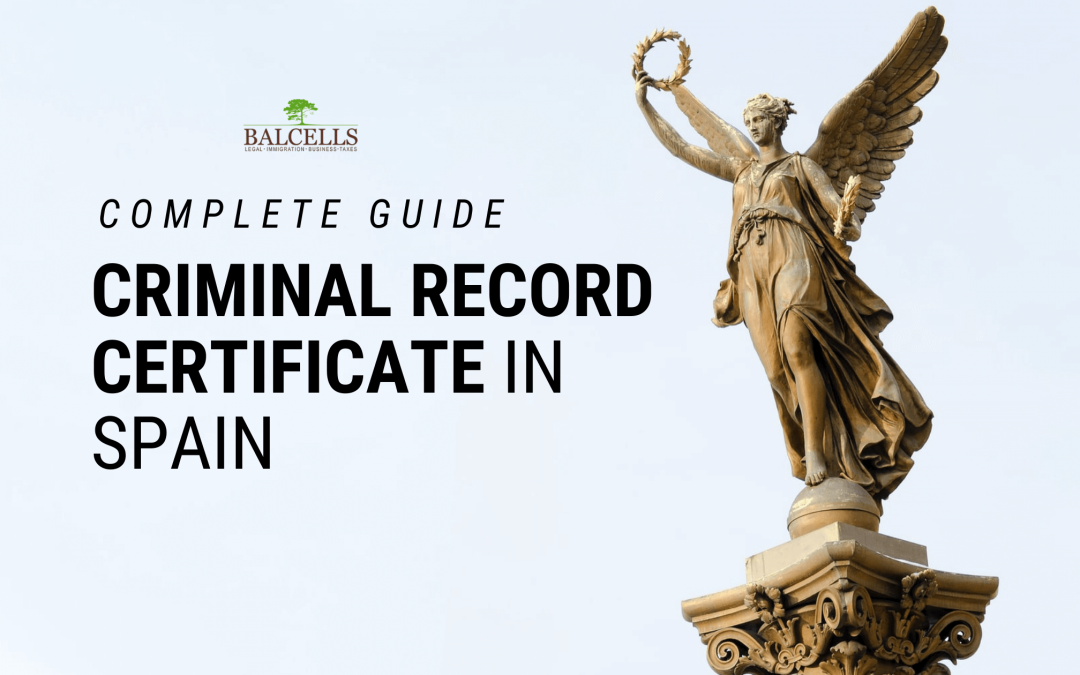In this article you are going to learn everything you need to know about the criminal record certificate in Spain. Whether you are a foreigner or not, in this guide you will learn how to apply for it step by step, how much do they cost, how long does it take to get them and how to cancel your police records to enjoy trouble-free procedures with the administration.
What are criminal records and what are they used for?
Whether you are a Spanish citizen or a foreigner residing in the country, for many procedures in the Spanish territory you will need to apply for a criminal record check. No matter if it is to obtain Spanish nationality, to enroll in public job positions, to start working in a school with children, or to avoid problems when renewing your residency card, this document will be essential.
This certificate shows whether or not you have registered any type of crime or activity against the law during the last few years.
This information is provided by the Central Criminal Registry and will be very useful in many legal proceedings as we will now see.
Although it is true that the Administration can verify it on a great number of occasions on their own (using their internal databases), in many others the interested party is asked to prove it by means of this document, which must be requested previously.
In this article we will show you how to get it and some other relevant considerations you must keep in mind. Something that any individual over 18 years old or entity through a representative can do.
Criminal records for foreigners
Before delving into how to apply for this certificate step by step, it is important to understand a small distinction first.
Applying for your criminal background check in Spain serves to prove that you have or don’t have any violation registration in Spain, which is where you are applying for it.
In other words, you would be accessing the register of crimes committed in Spain.
In order to apply for any residence permit, you must also provide the criminal records of the countries in which you have been residing for the last few years. More specifically, in the last 5 years.
And here lies the important difference.
These are obtained in your country of origin, not in Spain. And there the procedure is totally different and particular depending on the territory we are talking about. There is no general procedure that applies in all cases.
Therefore, you must make sure to follow the process required by the police in your country of origin or there where you have resided in order to apply for them correctly.
And, also, keep in mind that when they come from abroad, these documents must be legally translated and apostilled.
How do I get a criminal record check in Spain?
You can apply for them in two different ways. If you have a digital certificate, it is possible to carry out the procedure completely online by clicking on this link. On the other hand, it can be done in person or by postal mail by following the steps listed below.
The first thing you must do is fill out the application form. We are talking about the 790 model, and you can do it whether you have a digital certificate or not.
Where to do it? At the Central Office for Citizen Services in Madrid or at the Territorial Management Offices from the Ministry of Justice. In both cases you must get an appointment before attending.
Once you start the process, the second step is to provide the documentation that proves your identity. We are talking about a certified copy of your ID card (DNI) if you are a Spanish national or your residence card/passport if you are a foreigner. However, the driving license would also be valid as an identification document.
In case it is not the interested party but a third one who requests this certificate on her behalf, the representative must also provide a personal identification document and a document signed before a notary where the legal representation is validated.
Finally, the corresponding fees must be paid, providing proof of payment. The easiest way, if you have a digital certificate, is to make the payment online through the AEAT platform. But you can also pay through the electronic banking system (if you have an open account and an electronic signature), at an ATM, or by bank transfer if you are abroad.
How much does it cost?
As we have mentioned, the third and last step is to pay the corresponding fees. More precisely, the administrative fee to apply for this certificate costs € 3.78; associated with the 790 form.
How long does it take to get the Spanish criminal record check?
The administration has a legal period of 10 days to issue the certificate of criminal records after receiving the request. However, the most common thing is that they issue a response within no more than 3 working days after receiving the application, so it is a fairly quick process.
Clearance: how to cancel your criminal records
As we have mentioned, there are many procedures that you will face in which criminals records can be a very important barrier. One of the most extreme consequences of having them is the cancellation of your right to reside in Spain and the extinction of your residency card.
Thus, if you find yourself in a situation where you have criminal records registered, it will be very important to cancel them. And now we are going to explore how to cancel them.
The main requirements for this clearance are the following:
- First of all, you must serve the sentence imposed for the crime and let the time required by law to pass. For minor crimes, we are talking about 6 months. For serious crimes where the penalty does not exceed 1 year, you must let 1-year pass. For the rest of less serious crimes, the waiting time is 3 years, while for more serious crimes the maximum term is 5 years.
- . It is very important that you do not commit any crime during this waiting time.
- Finally, you will have to pay the civil responsibility.
But the process does not end here. A mistake that many foreigners make is not canceling their police records as well. You must do both: cancel the judicial ones and then the police ones.
In that sense, there are two types of police records: those generated by the National Police (you can access them through the Perpol file), and those generated by the Guardia Civil.
And it is not simply a matter of filling out the cancellation form at the police station and submitting it. It requires much more. You must ask for a certificate at the court clearly showing:
- Certificate number
- Date of attestation
- The reason for the arrest
- File status (filed, acquitted, etc.)
- Proof that the sentence is final
With this, you will be able to provide information about the crime you want to clear out, the reasoning behind, the attestations, etc. And you will guarantee to some extent that the process is a success.
Remember that if you have any doubts or need help from our immigration lawyer team, do not hesitate to reach out.
Book a consultation with one of our lawyers and solve all your doubts:



